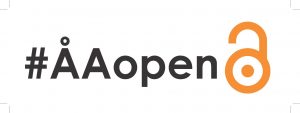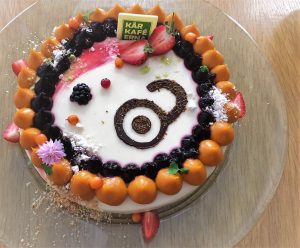The value of open science lies in the fact that its core ideals match or even underscore fundamental values of scholarship, such as transparency, responsibility and openness. That is why it’s worth engaging with – at its very core, it is responsible research practice gone digital. Starting out as a set of researcher-led initiatives, it has now come to be cherished by research funders and ministries as well.
At ÅAU, numerous open science related initiatives or practices are going on. Individual researchers or groups practice open science by using open science workflow tools such as OSF.io, publishing openly or even reproducibly, and opening their data. Below I present some of the things my office at the ÅAU Library is involved with in some way.
Green open access publishing. ÅAU hosts fulltext versions of scholarly publications authored by its researchers in the research information system Artur, which functions as an open repository. When you parallel publish your publication here (a peer reviewed version of it), it becomes available openly for anyone to read. The fulltext publication process is part of the process of validation of publication data which will be sent to the Ministry of Education and Culture, and based on which a share of the public funding granted to ÅAU is allocated. Much is going on in these regions as we speak – the services have been improved and enhanced greatly this year and the new, better platform AboCRIS is to replace the ancient but familiar Artur. With that, the visibility of parallel published papers in a range of international services will improve, and importing publication data will become much easier. Among other things.
Open access check. Are you thinking about whether to pay the fee or not, or which journal to choose? Or if it’s a serious open access journal or not? Contact us (openscience(a)abo.fi) and we will help you evaluate it.
Open access publication guide and APC-vouchers, credits and discounts. We’ve compiled a guide to open access for those who would like to learn more or gain an overview of issues and possibilities. In this guide, we keep the updated list of APC-agreements which render 10-100% discounts for gold open access (full or hybrid) in thousands of journals, available to all ÅAU-affiliated researchers.
The APC-pool. It covers the fees for full open-access publishing for one publication per year per corresponding author – apply before submission. It’s basic principles were tested in a pilot pool autumn 2019, in which open access to 18 papers was funded.
The central idea behind the pool was that gold open access is not available to all researchers at ÅAU equally today, but only to those in fields where most journals do not charge APCs or for scholars who have access to project funding for APCs. A reminder: so-called hybrid journals are subscription journals in which gold open access is sold as an additional, optional service against an APC. This is an expensive road to open access which can often well be substituted by green open access, i.e. parallel publishing in a reliable open repository). This is why the pool funds full open access publications which do not charge subscription fees (i.e. ”double-dipping”), but only APCs. The pool will also fund books and chapters, and we are working on reasonable principles for these types of publications, so do apply to help us get our heads straight!
Open science education for all. Courses or information showers on open access and research data management are offered to researchers directly via the staff training services, but also on demand to departments or research groups. In the years to come, an increasing number of short courses will be arranged. And longer ones.
The open science coach program. In spring 2019, the first group of researchers in the coach program enrolled for a two-year journey. Around 10 coaches are learning about all aspects of open science – how to do it, what’s behind it and so on. The coaches are your colleagues, there to assist you and help you find help. The coaches will also help us improve the support to researchers on open science issues. Would you like training to become a coach too? A new group will start in spring 2021 – keep your eyes on the staff newsletter. (A short set of slides on the coach program is found here.)
Research data management training. A very ambitions course, designed at University of Turku in 2018 was arranged in collaboration between UTU and ÅAU spring 2020. The course ”Basics of Research Data Management” 3 ECTS is open for both young and more experienced researchers and will run again in the spring 2021. In parallel, short courses on different themes relating to research data management will run for ÅAU staff, see Personnel training on the intranet. The point of rethinking the management of one’s data is manifold: research quality improvement, saving time and effort, avoidance of losing data, the possibility of preparing it for reuse in ways which have not been done before in many fields of research, but also acquiring the merits possible from making datasets findable and citable for others – or openly available, even. A guide on research data issues has been compiled to help researchers – a good place to get started.
Transparency of open access costs. The transition to an open access future should happen faster. We are now in a transition period since some years and the costs are in risk of escalating. Therefore, we need to make our costs for open access transparent to others than the publishers themselves. One way to do that is to keep track of APC payments and upload them to the open database OpenAPC. The work is in progress and we hope to be able to submit the 2019 information within a few months. Some of you will receive a survey questionnaire on your publications for this purpose. Please do give us a hand!
Open licenses. We need to learn to use Creative Commons licenses, to protect our rights as authors online (to powerpoint presentations, images, graphics, diagrams, research papers, blogposts…) and to ensure that our works can travel across the internet and be reused as widely as possible without being held back by unclear communication of reuse rights! Creative commons licenses are a system for informing users of your works what they are allowed and not allowed to do with it. We need to start using licenses (for free, and it only takes a few taps on the keyboard to license) to help our work spread. A good start is that there is a new version of the ÅAU powerpoint presentation template containing a cc-license statement on the intranet.
Open science support for research funding applications. Do you need to plan the sharing of data and publications and perhaps opening up your scholarly practices? There is assistance here for you. Also for the DMP.
FAIR/electronic lab notebook pilot spring 2020. Researchers from a few labs (chem & biosciences) are participating in the pilot of using OneNote (Microsoft 365) as electronic lab book. Peer support is a central feature in this pilot – some have used it long and we use Teams as a support channel. Progressing towards more transparency in lab science requires electronic lab notebooks, but what works the best? The pilot will be concluded with a session on how to describe and deposit lab note books in Fairdata.fi to make them citable datasets. We are delayed due to the Corona pandemic, so if you are interested, do join in.
What do you have cooking? Get in touch!



 https://orcid.org/0000-0002-9323-0694
https://orcid.org/0000-0002-9323-0694